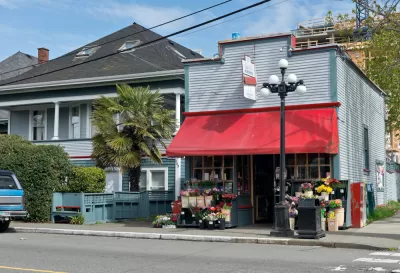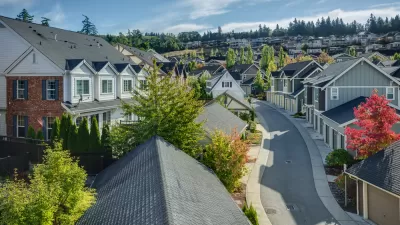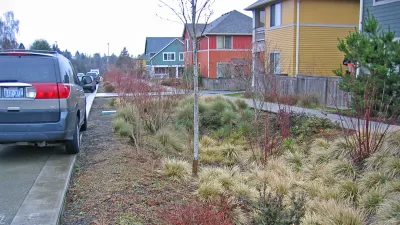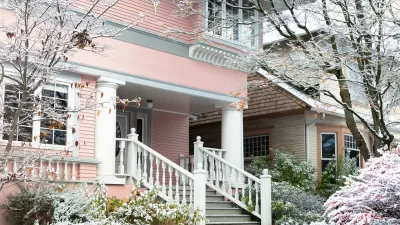Seattle's city council considers reducing 'arbitrary' and 'exclusionary' limits on home-based businesses.

In California, the humble garage-based business has been elevated to the level of myth by the Silicon Valley giants who tout their early, heady startup days working out of their home garages. With the pandemic causing tectonic shifts in how and where we work, writes Ray Dubicki in The Urbanist, garage businesses provide one more lifeline for struggling entrepreneurs and small businesses. Yet in some cities, outdated zoning codes prevent many businesses from being legally conducted in homes. In Seattle, "zoning code excludes all sorts of uses throughout the 75% of the city that’s strictly zoned for single-family detached homes." The concept of "home occupations," activists argue, is outdated and harmful to both small businesses and the vibrancy of neighborhoods.
The recent shutdown of Yonder Cider's garage tasting room illustrates the problem. In the Greenwood Urban Village where the cidery was located, "slightly higher density and commercial uses are allowed only on the single lots that line Greenwood Avenue N or N/NW 85th Street. It’s a crucifix of apartments and shops carved into a sea of single-family detached homes. Had they been on the other end of the same block, Yonder would have no problem selling cider." In order to reopen, the cidery must meet a variety of requirements that force it to "innocuously and invisibly disappear into the quaint residential fabric of its surroundings." The narrow allowances for commercial uses in Seattle's "urban villages" have the effect of reducing walkability and eliminating the potential for small local businesses in all but a small section of each neighborhood.
Opponents of the current home occupations laws argue that they are arbitrary and exclusionary, making it more difficult for people to use their property to earn income and discriminating based on occupation. A bill drafted in Seattle's city council seeks to adjust home occupations regulations by suspending parking, exterior appearance, and appointment rules for the next year and seeks to permanently lower barriers to meaningful employment and entrepreneurship. "The Bringing Business Home bill will strengthen neighborhoods and get us closer to complete neighborhoods with amenities–including childcare–for Seattle residents and families," said City Council President M. Lorena González. In Portland, a proposal for "accessory commercial units" seeks to complement the recent push for more small residential units and make neighborhoods more complete and walkable.
FULL STORY: Garage Businesses Are Keys to Covid Recovery

Planetizen Federal Action Tracker
A weekly monitor of how Trump’s orders and actions are impacting planners and planning in America.

Chicago’s Ghost Rails
Just beneath the surface of the modern city lie the remnants of its expansive early 20th-century streetcar system.

San Antonio and Austin are Fusing Into one Massive Megaregion
The region spanning the two central Texas cities is growing fast, posing challenges for local infrastructure and water supplies.

Since Zion's Shuttles Went Electric “The Smog is Gone”
Visitors to Zion National Park can enjoy the canyon via the nation’s first fully electric park shuttle system.

Trump Distributing DOT Safety Funds at 1/10 Rate of Biden
Funds for Safe Streets and other transportation safety and equity programs are being held up by administrative reviews and conflicts with the Trump administration’s priorities.

German Cities Subsidize Taxis for Women Amid Wave of Violence
Free or low-cost taxi rides can help women navigate cities more safely, but critics say the programs don't address the root causes of violence against women.
Urban Design for Planners 1: Software Tools
This six-course series explores essential urban design concepts using open source software and equips planners with the tools they need to participate fully in the urban design process.
Planning for Universal Design
Learn the tools for implementing Universal Design in planning regulations.
planning NEXT
Appalachian Highlands Housing Partners
Mpact (founded as Rail~Volution)
City of Camden Redevelopment Agency
City of Astoria
City of Portland
City of Laramie





























